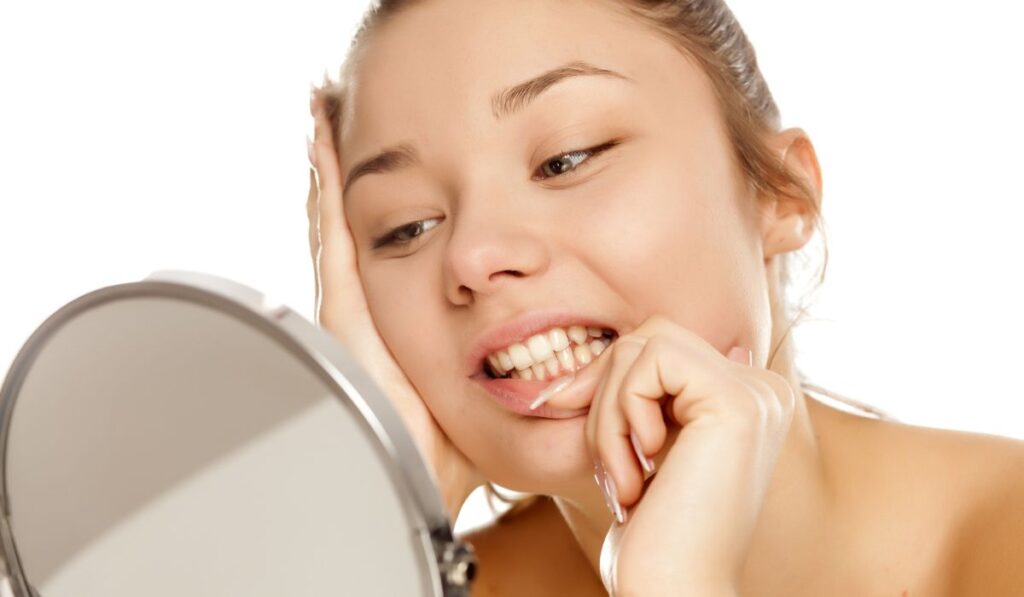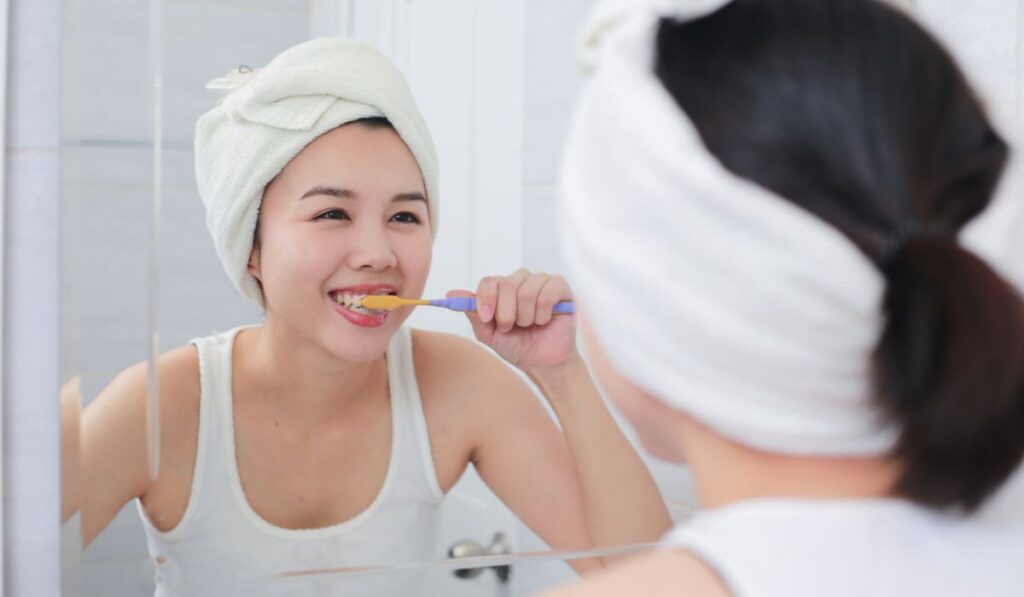Everyone, at some point in their lives, gets yellow teeth. Sometimes it can be situational and fixed with a correction of bad habits or a visit to the dentist. Other times it takes a hard look at your diet and making a few changes. Yet sometimes, it can be a simple matter of getting older, which no one can avoid.
Food, drinks, or smoking can cause yellow teeth. Treatments like whitening mouthwash, toothpaste, or strips can help with some stains. However, it could be caused by things we can’t help, like aging, genetics, and trauma. Unfortunately, there aren’t many treatments that can help with that.
Sometimes we suffer from yellowing teeth, but the truth is that it’s a natural course of life that everyone eventually has. However, if you are concerned about the yellowing of your teeth, it is always a good idea to talk with your dentist.
Why are Your Teeth So Yellow Even Though You Brush Regularly?

There are many reasons why your teeth might be yellow even though you brush twice a day. Sometimes it’s because you aren’t brushing well enough or long enough; other times, it’s entirely out of your control.
Intrinsic and Extrinsic Stains
Two types of stains can occur on your teeth. Intrinsic stains consist of a yellow discoloration tightly bonded to the tooth enamel and will not come off with simple brushing.
It’s so deeply embedded that no toothpaste or vigorous brushing will be able to reach it since the bristles of a toothbrush only stay at surface level.
Extrinsic stains are when the yellow discoloration can be easily removed since they are only on the surface of your tooth. This essentially gives your toothbrush the ability to reach and remove the stains.
Staining Caused by Food and Drinks
If there is any kind of food coloring in your food or drinks, your teeth will get stained. A general rule of thumb is if it stains a white carpet, it will stain your teeth. On the other hand, some drinks, like coffee, tea, and red wine, are famous for causing yellow teeth.
To avoid discoloration, some people drink these beverages through a straw so the staining liquid doesn’t touch their teeth.
Using Tobacco or Smoking
The tar from tobacco or any type of smoking can cause discoloration of the plaque and tartar that line your teeth. The staining is usually proportional to the amount you smoke as well.
So if you smoke two packs a day, you will have worse staining than someone who smokes sparingly.
Bad Oral Hygiene
Another cause of yellow staining is poor oral hygiene. If you don’t brush well or floss, you will develop plaque in your mouth. If that plaque isn’t removed through brushing and flossing, it develops into tartar, which a dentist must remove.
This plaque and tartar buildup is what causes the discoloration of your teeth.
Aging
Over time, as people age, their teeth slowly become yellow. This is just the natural process of life, with children having the whitest teeth and seniors having the most yellow.
Genetics
Like everything about our bodies, genetics plays a large part in whether you have yellow teeth or not. This is because the thickness of your enamel influences the color of your teeth. So if you have really thick teeth, they will be more naturally yellow than someone with thinner enamel.
Medications
Some side effects of certain medications can cause yellowing of the teeth, like a common acne medication called Tetracycline.
Dry Mouth
Some people don’t realize that having a dry mouth can cause yellowing of the teeth. If your mouth is dry, you tend to accumulate plaque more easily, which is the cause of yellowing teeth.
Trauma
If your teeth have sustained trauma and died, they will turn a shade of yellow. Dead teeth look different than healthy teeth because once they die, there is no longer any blood or nutrients being delivered to them.
Can Yellow Teeth Become White by Brushing?
Brushing your teeth can sometimes help with staining if the discoloration is due to extrinsic stains. It will have little effect in removing intrinsic stains, but brushing your teeth can make them whiter and stay white longer. This is because brushing removes the extrinsic stains and prevents any new staining from occurring, making them whiter.
Maintaining good oral hygiene is key to preventing further stains from food and drinks and plaque and tartar. However, if the yellowing is occurring because of age, genetics, or medications, then no amount of brushing will help.
What is the Best Way to Whiten Teeth?

You can get several kinds of whitening treatments to help reduce the yellowing stains. However, practicing good oral care and a healthy diet is the best way to prevent future yellowing.
Brushing your teeth at least twice a day and flossing during that time is recommended. Ideally, you would brush after each meal to get surface stains and food particles out of your mouth. You should aim to brush for two minutes in circular motions and move the bristles of your soft or extra-soft toothbrush away from the gums.
You can also try to avoid food and drinks with food coloring in them, or at least lessen your intake of those items. For beverages, there is the technique of drinking through a straw to bypass the liquid from touching your teeth.
In addition to good oral hygiene and a healthy diet, you can also purchase some over-the-counter whitening treatments such as:
If the over-the-counter products aren’t helping, you can always talk with your dentist about in-office treatments such as bleaching, laser, or heat treatment. There is also the possibility of a custom-fitted tray whitening system.
So, is Yellow Teeth Normal?
Yellow teeth are very normal. Most people get some form of staining throughout their lives.
Whether drinking too much coffee or just getting older, most people have yellow teeth, and not all treatments can work to correct them, especially if it’s due to aging, medication, or genetics.
If you’re concerned about your yellow teeth, it is always best to talk to your dentist. They can provide some insight into the cause that is unique to your situation and could provide additional help and in-dentist treatment to aid in whitening your teeth.


